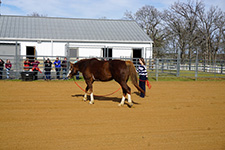
FAYETTEVILLE, Ark. –The D.E. King Equine Program in the University of Arkansas’ Department of Animal Science has earned national accreditation and certification from the Certified Horsemanship Association following an extensive on-site review.
The equine program, housed in the Dale Bumpers College of Agricultural, Food and Life Sciences, hosted the review team March 31 through April 3 as it reviewed compliance standards and observed management of the following: horses, student staff, volunteers and equine facilities. Reviewers also monitored protocols and rules, and tracking systems at the D.E. King Equine Pavilion.
“This is a major accomplishment for our program, the department and the college,” said instructor and barn manager Kathi Jogan. “There were 56 standards we had to show we were in compliance with and addressing. Everyone involved in this process did an amazing job.”
“We realize our equine program is top-notch,” said Michael Looper, animal science department head and professor. “Accreditation and certification communicates to the rest of the world the excellence achieved by our equine faculty and staff.”
 |
| Brooke Satterwhite skills demonstration |
Since 1967, the Certified Horsemanship Association has promoted excellence in safety and education for the benefit of the horse industry by certifying instructors and accrediting equine facilities. To earn accreditation, equestrian programs must meet CHA standards in areas of safety and liability issues, operation of the program, and management of facilities, activities and horses.
“We have never been so impressed with the information presented to us documenting standards as we were with what Dr. Jogan and the University of Arkansas presented to us,” said Polly Haselton Barger, lead reviewer for the association. “In fact, this is the first time we have ever asked for copies of standards compliance notebooks. We intend to use them as teaching tools for our reviewer teams.”
The Equine Facilities Manager Certification process is a 20-hour clinic which evaluates participants on skills and knowledge of facility and horse management. Participants demonstrate skills and take written tests at levels up through Level 4 certification.
Level 1 is a stable worker, qualified to work in a barn under supervision of a manager; Level 2, stable manager, qualified to manage a small private stable of up to 10 horses with one or two employees; Level 3, herd manager, qualified to manage a public facility of up to 35 horses and three or four employees; and Level 4, equine facility manager, qualified as general manager of a commercial operation with more than 35 horses and five or more employees.
Nine students, along with Jogan, participated in the clinic. Jogan earned Level 4 certification while all nine students earned either Level 2 or 3.
“Never has anyone achieved the perfect scores recorded by Dr. Jogan on the CHA EFM Level 4 Certification review in the 10 years this program has been in place,” said Haselton Barger.
 |
| Eugenia Fletcher skills demonstration |
Students completing certification were Caitlin Barnett, Taylor Breeding, Morgan Crosby, Mackenzie Curtis, Eugenia Fletcher, Laura Kirkley, Brandon Oates, Brooke Satterwhite and Sheri Thomson. Barnett, Curtis, Fletcher, Kirkley, Satterwhite and Thomson are animal science majors. Breeding is in agricultural economics and agribusiness, Crosby in child development and Oates kinesiology.
“Our mission is to enhance and broaden students’ educational and experiential learning opportunities to better prepare them for career placement and life-long learning,” said Looper. “To accomplish this mission, the Department of Animal Science provides hands-on training, experience and development of skills by students. Accreditation of our equine program from the CHA is the industry’s stamp of approval that we are providing our students high-quality equine education and training.”
“The reviewers were very impressed with our students’ preparation and professionalism,” said Jogan. “Through this site accreditation, we are recognized as being shoulder to shoulder with the best-managed equine facilities in the country.”
Jogan was awarded a grant from the American Quarter Horse Foundation last spring, which funded the accreditation and certification process.
The Bumpers College offers an equine science concentration for animal science majors and an equine science minor for students with other majors. All U of A students are welcome to participate in equine activities at the King Equine Pavilion, which is home to 10 horses.
About the Dale Bumpers College of Agricultural, Food and Life Sciences: Bumpers College provides life-changing opportunities to position and prepare graduates who will be leaders in the businesses associated with foods, family, the environment, agriculture, sustainability and human quality of life; and who will be first-choice candidates of employers looking for leaders, innovators, policy makers and entrepreneurs. The college is named for Dale Bumpers, former Arkansas governor and longtime U.S. senator who made the state prominent in national and international agriculture.
About the University of Arkansas: The University of Arkansas provides an internationally competitive education for undergraduate and graduate students in more than 200 academic programs. The university contributes new knowledge, economic development, basic and applied research, and creative activity while also providing service to academic and professional disciplines. The Carnegie Foundation classifies the University of Arkansas among only 2 percent of universities in America that have the highest level of research activity. U.S. News & World Report ranks the University of Arkansas among its top American public research universities. Founded in 1871, the University of Arkansas comprises 10 colleges and schools and maintains a low student-to-faculty ratio that promotes personal attention and close mentoring.
Topics
Contacts
Robby Edwards, director of communications
Dale Bumpers College of Agricultural, Food and Life Sciences
479-575-4625, robbye@uark.edu